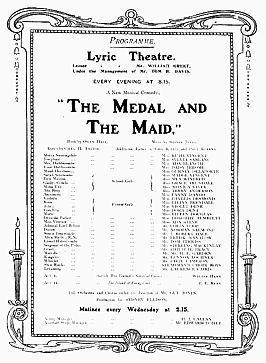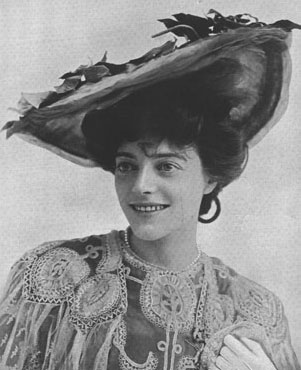 THE MEDAL AND THE MAID
THE MEDAL AND THE MAID
Book by Owen Hall, Music by Sidney Jones, Lyrics by Charles H. Taylor.
Additional lyrics by George Rollit and Paul Rubens
Lyric Theatre, London - 25 April, 1903 (revised 15 August,1903
Broadway Theatre, New York - 11 January, 1904 (49 perfs)
Story
The sacred traditions of musical plays are invariable, the foremost of them is that at any given moment, any person can be anybody else without detection, and with complete success and that, further, they may resume their identity in an equally inconsequent manner and with the approval of all concerned.
When Josephine appears with a medal, the gift of her father, who thus discharged his parental duties to his daughter and disappeared, we are prepared to recognise, or to see others recognise, Josephine in any temporary possessor of that token.
Miss Ventnor played by Ada Reeve |
Merva Sunningdale, an heiress, and a pretty one too, knowing this, sees her chance of a little fun, and when on her way to Miss Ventnor's school she meets Josephine, the exchange is quickly made, and though their attires have changed, it is the medal that does it. Thus we start very early with an heiress who is really a flower girl and a flower girl who is really an heiress. There would be no further consequences involved in such a change were it not for incidents in the recent careers of both ladies and which tends towards confusion. Merva, the heiress (now a flower girl), had met a young officer at Colombo, and "the attraction had been mutual," whereas Josephine, the flower girl (now an heiress) had, in a fit of temper, provoked by the undue familiarity of a sailor, stabbed her tormentor with a knife that she had kept concealed in her stocking.
Whilst Nemesis pursues in hot haste both damsels, we can turn to Miss Ventnor, the proprietor of a highly-original ladies' academy, where the pupils are prepared on the most modern lines for their ultimate entrance into polite society. Of the students' qualifications we learn at a prize distribution, Miss Ventor having secured a gallant admiral to preside at the function. It is a smart affair and is graced by the presence of the élite of Cannes, among whom we find Mrs. Habbicombe and her eccentric literary friend, Mr Simon Pentweazle.
Now, when we get to know her, Mrs Habbicombe is a very great lady, or a very rich one - which is, of course, the same thing - and the appearance of Simon on the scene is due to his admiration of her many charms. This flame had not been fanned at fashionable receptions or social gatherings; it was not at the houses of the great that Simon had met his Jane, but in the capacity of business manager to Mrs Ezra Hart, dealer in old clothes. That lady had won his heart by her shrewdness and capability, and Mrs Ezra Hart is none other than the smart Mrs Habbicombe. Now, admiration in Goswell Road is one thing, but when it journeys thence to Cannes, and is obtrusive after the Goswell Road fashion, it becomes a thing to be dreaded. So Simon, having a taste for poetic quotation, is introduced as a literary friend, and takes quite a creditable position at the prize distribution.
Meanwhile, Nemesis is at hand. The young lieutenant turns up and recognises in the local flower girl, the girl he met and fell in love with at Colombo. A sergeant of the gendarmerie arrives at about the same time and arrests her for the little stabbing affair that is part of the career of Josephine. Whether she was bailed out or whether the charge failed for want of evidence we do not learn, but, it is quite certain that we meet both the sham flower girl and the false heiress free, on the island of Karogovina, where all the parties have repaired for a trip. The school is there, so is the charming schoolmistress, so are some particularly ferocious, but methodical, brigands. So too, is Darien, the chief of bandits, who proceeds to imprison all and sundry for the sake of the heavy ransoms he means to demand. Obviously, however, they cannot all be kept on the island. Food is scarce and the ransom value of some of the crowd is not worth their keep. Who then shall be kept and who shall be sent away? To solve this problem, Darien makes use of the schoolmistress, whose information on the point is valuable, and whose company is far from unwelcome.
Miss Ventnor makes a rapid conquest and is conquered, but what is much more to the point, gives him the information he seeks. Darien wants the wealthiest left behind. Miss Ventnor has an heiress among her pupils. The heiress shall stay and the thing is settled.
In true musical comedy fashion the story unwinds from tangle into tangle, but in the end, the happiness of the real Merva and her lieutenant, who are married after the laws of Karogovina, and after that - nothing really matters.
Principal Musical Numbers:
- Click Went the Kodak
- The Lady Wasn't Taking Any Fruit
- Brigand Chief
- Hide and Seek
- If Girls Had Wings
- In Zanzibar
- The Man Behind
- My Love I Dare Not Tell Thee
- Publicity
- In My Curriculum - Miss Ventnor & the Admiral
- Vanderdecken
- Any Sort of Girl
- The Philosophic Brigand
- The Frills Upon the Petticoat - Ladies of the Academy
- A Prize For That
- Polo
- Rain or Shine
- A Well Bred Girl
- Consequences - Merva & Allen
- Katie Had a Kodak
- Who'll Buy My Flowers?
